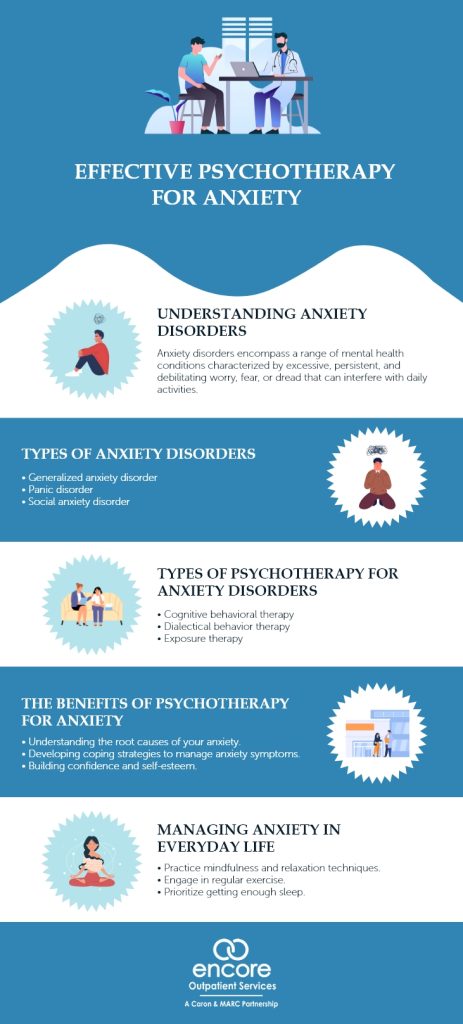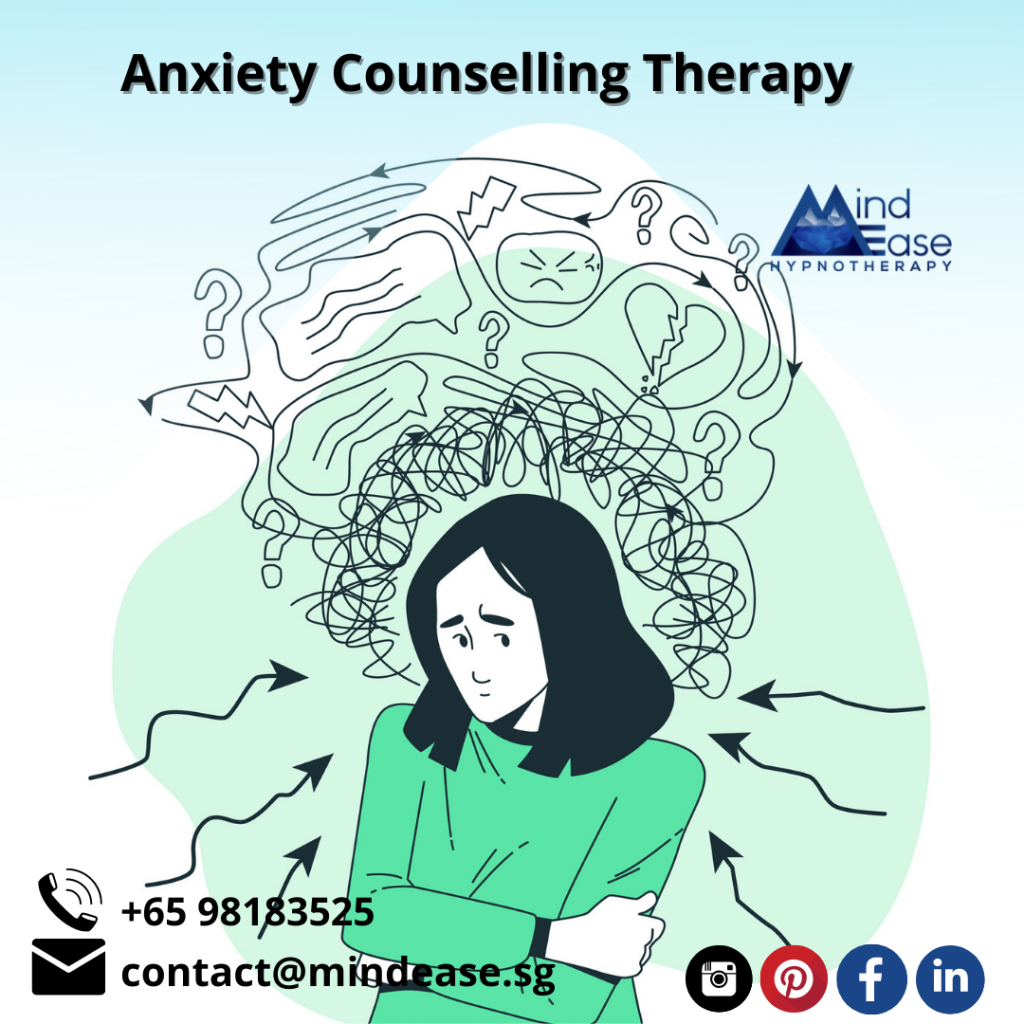Counselling for anxiety disorder: Personalized sessions designed for your needs
Counselling for anxiety disorder: Personalized sessions designed for your needs
Blog Article
Exploring Different Strategies in Counselling for Anxiousness Condition for Long Lasting Change
When dealing with stress and anxiety disorders, it's important to discover a range of therapy approaches. Each method provides unique insights and tools to help you manage your symptoms effectively. You might find that combining techniques can yield the very best results. Comprehending the nuances of these techniques is crucial to cultivating long-term adjustment. What if the appropriate mix could release a brand-new degree of psychological well-being for you?
Recognizing Stress And Anxiety Disorders: A Brief Review
Anxiousness problems, which influence numerous people worldwide, can significantly affect day-to-day live. You might experience frustrating feelings of fear or stress that seem uncontrollable. These sensations can result in physical symptoms like an auto racing heart, sweating, or even dizziness. Usual types of stress and anxiety disorders consist of generalised stress and anxiety condition, panic problem, and social anxiousness problem. Each has one-of-a-kind indications, but they all share a propensity to disrupt your regular and relationships.Understanding the root causes of your anxiety is essential. It may come from genetics, brain chemistry, or life experiences. Acknowledging your triggers can help you handle your actions much better. It is essential to keep in mind that you're not alone in this battle. Lots of individuals face similar difficulties, and seeking assistance is a solid step toward sensation better. By finding out about anxiety conditions, you're currently on the path to understanding and managing your problem much more effectively.
Cognitive-Behavioral Treatment: Challenging Unfavorable Thought Patterns
In Cognitive-Behavioral Therapy, you'll start by determining the adverse thought causes that add to your anxiousness. You'll work on replacing them with more positive options when you recognize these thoughts. With each other, you'll construct reliable coping strategies to assist manage your stress and anxiety in day-to-day situations.
Identifying Negative Thought Triggers

When you encounter moments of distress, identifying the particular triggers behind your adverse ideas can be important in handling stress and anxiety. Start by paying focus to scenarios that provoke sensations of fear or worry. Is it a crowded area, an approaching due date, or a discussion with certain people? Write down these circumstances in a journal. This will help you identify patterns in your reasoning. Likewise, notice physical sensations that accompany your negative thoughts, like a racing heart or rigidity in your upper body. By pinpointing these triggers, you gain insight into what's fueling your anxiousness. Recognizing these connections is the initial step in challenging those thoughts and inevitably reclaiming control over your psychological responses.
Replacing Ideas With Positives
Challenging adverse idea patterns is an important action in changing your mindset and reducing stress and anxiety. You might frequently locate on your own trapped in cycles of insecurity or tragic thinking. As opposed to allowing these ideas determine your feelings, method changing them with realistic options or favorable affirmations. For instance, when you believe, "I can not handle this," move it to, "I can manage difficulties one action at a time." This easy change can greatly influence your mood. Consistently determining and responding to these adverse ideas aids develop a healthier interior discussion. Remember, it takes time and effort, yet consistently practicing this strategy can lead to lasting change, empowering you to face anxiety with renewed confidence and strength.
Structure Coping Methods With Each Other
Changing negative thoughts is only the beginning of managing stress and anxiety properly. To develop lasting modification, you need to develop coping approaches that equip you. Cognitive-Behavioral Therapy (CBT) helps you determine and challenge those purposeless idea patterns. Together, you and your counselor can check out just how these ideas influence your feelings and behaviors.Start by developing functional strategies, like journaling or mindfulness exercises, that permit you to challenge anxiousness head-on. When you encounter your anxieties slowly, you'll discover to react differently.

Mindfulness and Acceptance-Based Approaches: Growing Present-Moment Understanding
As you browse the complexities of stress and anxiety, incorporating mindfulness and acceptance-based techniques can considerably improve your capacity to cultivate present-moment understanding. By concentrating on the below and now, you'll locate that you can observe your thoughts and sensations without judgment (Counseling services for anxiety). This practice aids you acknowledge your anxiousness without feeling bewildered by it.Engaging in mindfulness workouts, such as deep breathing, body scans, or directed meditations, permits you to ground on your own in your current experience. Acceptance-based techniques urge you to embrace your emotions instead than fight against them. They lose their power over you.Incorporating these methods right into your day-to-day routine can transform exactly how you react to anxiousness when you accept your feelings. You'll create durability and learn to navigate stressful circumstances with greater ease. Ultimately, growing present-moment understanding lays the structure for lasting modification, equipping you to lead a much more fulfilling life
Direct Exposure Therapy: Facing Anxieties Progressively
Direct exposure therapy assists you face your anxieties in a gradual way, making it much less frustrating. You'll learn methods to encounter anxiety-provoking situations detailed, while also building coping strategies to manage your responses. This strategy equips you to take control and lower stress and anxiety with time.
Gradual Exposure Strategies

When facing stress and anxiety, gradually challenging your anxieties can be an effective means to regain control. This strategy, referred to as progressive exposure, involves slowly revealing yourself to the scenarios or things that trigger your anxiety. Start with much less daunting circumstances and gradually function your method approximately more challenging ones. As an example, if you're terrified of public talking, you may start by speaking in front of a mirror, then advance to sharing thoughts with a good friend, and eventually attend to a little team. Each step helps desensitize you to the worry, constructing your confidence in time. Bear in mind, it's vital to rate yourself and celebrate little triumphes as you move via this process, strengthening your ability to handle stress and anxiety successfully.
Structure Coping Strategies
Structure effective coping approaches is essential for handling stress and anxiety, specifically as you confront your concerns gradually - Counseling services for anxiety. One powerful technique is direct exposure therapy, where you start by facing your worries in a controlled fashion. Begin with much less intimidating situations and slowly function your way up to even more difficult circumstances. This progressive direct exposure aids desensitize you to stress and anxiety triggers, making them link much less overwhelming.Incorporate relaxation strategies, such as deep breathing or mindfulness, to soothe your mind during exposure. Track your progression, celebrating tiny victories along the means to improve your confidence. Remember, it's alright to take your time; the goal isn't perfection yet consistent renovation. By building these techniques, you'll empower yourself to navigate stress and anxiety and accept life a lot more completely
Psychodynamic Therapy: Revealing Source of Anxiousness
Psychodynamic treatment discovers the subconscious mind, exposing the origin of your stress and anxiety. By analyzing your ideas, feelings, and previous experiences, this approach aids you reveal underlying conflicts and unsettled problems that may browse around this site contribute to your existing anxiety. You'll work with a therapist to explore childhood years experiences, relationships, and psychological patterns that form your actions today.As you gain insight right into these deeper layers of your subconscious, you'll begin to identify how previous occasions influence your present behavior. This understanding can bring about catharsis, allowing you to process emotions you could have suppressed.Through the healing connection, you can also determine defense systems that might have developed over time, supplying a clearer course to transform. Ultimately, psychodynamic treatment furnishes you with the tools to resolve your anxiety at its core, advertising long-term change in your psychological health.
Holistic and integrative Approaches: Incorporating Methods for Greater Efficacy
Incorporating different therapeutic strategies can improve your trip toward taking care of stress and anxiety better. By incorporating aspects from cognitive-behavioral treatment, mindfulness practices, and alternative approaches, you can develop an individualized strategy that addresses your one-of-a-kind needs. For circumstances, you could make use of cognitive-behavioral techniques to challenge adverse thought patterns while incorporating mindfulness exercises to ground on your own in the existing moment.Additionally, discovering holistic practices such as yoga exercise or meditation can advertise leisure and lower stress and anxiety signs and symptoms. This blend permits you to establish higher self-awareness and resilience.Experimenting with these varied techniques can assist you find what reverberates most with you. Bear in mind, it's concerning finding a harmony that functions, instead of sticking to a single strategy. This integrative approach not just uses instant alleviation however additionally promotes lasting his response skills for handling anxiety, equipping you to recover control over your life.
The Duty of Support Solutions: Building Durability Through Link
While it may seem that taking care of stress and anxiety is a solitary trip, having a solid support group can play a necessary function in your strength. Bordering on your own with empathetic good friends, family, or support system creates a safe room where you can openly share your experiences and sensations. When you get in touch with others, you remind yourself that you're not the only one in this struggle.These relationships use motivation and can offer functional coping approaches that have benefited others. It's also an opportunity to obtain point of view; friends can assist you see scenarios in a different way, minimizing feelings of isolation.Moreover, psychological assistance promotes a sense of belonging, which can substantially ease stress and anxiety signs. By leaning on your support group, you can build resilience and take on obstacles better. Remember, connecting for aid signifies stamina, and it can make all the difference in your journey towards taking care of anxiety.
Frequently Asked Inquiries
What Are the Typical Signs of Stress And Anxiety Problems?
You might experience restlessness, exhaustion, problem focusing, irritability, muscle stress, and sleep disturbances. Physical signs and symptoms can include quick heartbeat, sweating, and trembling. Identifying these indicators early can assist you seek proper support and therapy.
The Length Of Time Does Therapy Typically Last for Stress And Anxiety Problems?
Treatment for anxiety disorders generally lasts anywhere from a couple of weeks to several months. It actually depends on your specific demands, development, and the techniques your therapist utilizes to help you handle your stress and anxiety successfully.
Can Medication Be Used Alongside Therapy for Anxiousness?
Yes, drug can most definitely be used alongside treatment for anxiety. Integrating both strategies commonly enhances treatment efficiency, aiding you take care of signs while discovering underlying problems via therapy (Counseling services for anxiety). Always consult your doctor for tailored advice
Are There Self-Help Approaches for Taking Care Of Anxiousness?
Yes, there are numerous self-help approaches for managing anxiousness. You can practice mindfulness, participate in routine workout, maintain a balanced diet plan, establish a regular, and utilize deep breathing methods to aid decrease stress and anxiety signs and symptoms successfully.
Exactly how Do I Know if I Need Specialist Aid for Anxiety?

Report this page